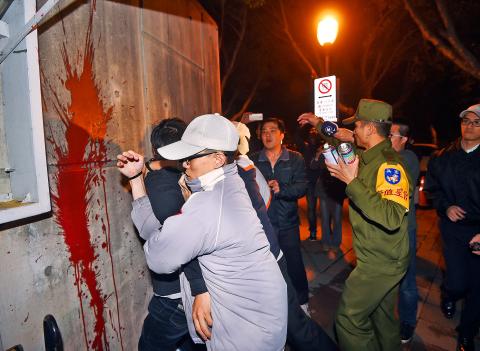Taiwan Solidarity Union (TSU) members in the early hours of yesterday staged a protest outside the presidential residence ahead of China’s scheduled inauguration of the controversial M503 flight route today.
Protesters shouted: “Withdraw the M503 flight route” and “President Ma Ying-jeou (馬英九), step down.”
Loud screams broke the quiet night near the presidential residence when several men and women holding protest signs arrived by van and motorcycle, and ran toward the entrance gate on Chongqing S Road in Taipei.

Photo: Fang Pin-chao, Taipei Times
Security guards were immediately alerted, with several plainclothes officers rushing to the site of the protest and quickly confronting the participants.
However, as officers tried to gain control of the situation in front of the gate, another group of protesters arrived at the northeastern corner of the presidential residence, spreading red paint on a wall.
More officers rushed from across the street, wielding metal shields and batons.
“We are here to demand that Ma decline to accept China’s inauguration of the M503 flight route, because it is a trap for Taiwan, and Ma is selling out Taiwan’s interests,” TSU Youth director Chang Chao-lin (張兆林) said as he was dragged away by security personnel.
“We call on all Taiwanese to stand up, we should all stand up in protest against Ma,” he added.
Besides clashes with the protesters, there were also minor verbal disputes between military police officers and journalists, as officers initially tried to prohibit journalists from taking pictures of the paint-splattered wall.
A total of 13 protesters were later taken to the nearby Zhongzheng Second Police Precinct Office for interrogation.
Deputy Precinct Chief Yu Tseng-hsiang (于增祥) said the protesters who threw red paint at the presidential residence would be charged with violating the Waste Disposal Act (廢棄物清理法).
Each was fined NT$6,000 for the waste disposal violations. Eight protesters also faced charges of interfering with public functions over the clash, a police officer said.
Presidential Office spokesman Charles Chen (陳以信) condemned the protest as an “act of violence.”
“The Republic of China is a democracy, and Taiwan is a society with the rule of law,” he said. “Any political appeal should be made based on the rule of law, and not surpass the boundary of being peaceful and rational.”
The protesters were released after questioning, and vowed to take further actions if the government does not respond positively to their demands.

ACTION PLAN: Taiwan would expand procurement from the US and encourage more companies to invest in the US to deepen bilateral cooperation, Lai said The government would not impose reciprocal tariffs in retaliation against US levies, President William Lai (賴清德) said yesterday, as he announced five strategies to address the issue, including pledging to increase Taiwanese companies’ investments in the US. Lai has in the past few days met with administrative and national security officials, as well as representatives from various industries, to explore countermeasures after US President Donald Trump on Wednesday last week announced a 32 percent duty on Taiwanese imports. In a video released yesterday evening, Lai said that Taiwan would not retaliate against the US with higher tariffs and Taiwanese companies’ commitments to

‘SPECIAL CHANNEL’: Taipei’s most important tasks are to stabilize industries affected by Trump’s trade tariffs and keep negotiations with Washington open, a source said National Security Council Secretary-General Joseph Wu (吳釗燮) arrived in the US for talks with US President Donald Trump’s administration, a source familiar with the matter said on Friday. Wu was leading a delegation for a meeting known as the “special channel,” the Financial Times reported earlier. It marked Trump’s first use of the channel since returning to the White House on Jan. 20. Citing a source familiar with the matter, the Financial Times reported that Minister of Foreign Affairs Lin Chia-lung (林佳龍) was also a part of the delegation. The visit came days after China concluded war games around Taiwan and amid Trump’s

Intelligence agents have recorded 510,000 instances of “controversial information” being spread online by the Chinese Communist Party (CCP) so far this year, the National Security Bureau (NSB) said in a report yesterday, as it warned of artificial intelligence (AI) being employed to generate destabilizing misinformation. The bureau submitted a written report to the Legislative Yuan in preparation for National Security Bureau Director-General Tsai Ming-yen’s (蔡明彥) appearance before the Foreign Affairs and National Defense Committee today. The CCP has been using cognitive warfare to divide Taiwanese society by commenting on controversial issues such as Taiwan Semiconductor Manufacturing Co’s (TSMC, 台積電) investments in the

HELPING HAND: The steering committee of the National Stabilization Fund is expected to hold a meeting to discuss how and when to utilize the fund to help buffer the sell-off The TAIEX plunged 2,065.87 points, or 9.7 percent, to close at 19,232.35 yesterday, the highest single-day percentage loss on record, as investors braced for US President Donald Trump’s tariffs after an extended holiday weekend. Amid the pessimistic atmosphere, 945 listed companies led by large-cap stocks — including Taiwan Semiconductor Manufacturing Co (TSMC, 台積電), Hon Hai Precision Industry Co (鴻海精密) and Largan Precision Co (大立光) — fell by the daily maximum of 10 percent at the close, Taiwan Stock Exchange data showed. The number of listed companies ending limit-down set a new record, the exchange said. The TAIEX plunged by daily maxiumu in just